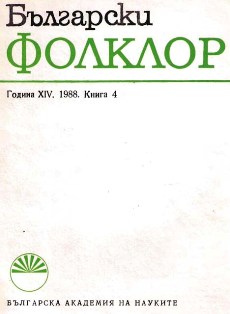Просякът певец във фолклорната култура на славяните (Опит за функционално-семантична характеристика)
The Beggar-Singer in the Folklore Culture of the Slavs (An Attempt at a Functional and Semantic Characteristics)
Author(s): Katya Zhivkova MihaylovaSubject(s): Anthropology
Published by: Институт за етнология и фолклористика с Етнографски музей при БАН
Summary/Abstract: The article deals with the semantics of the beggar based mainly on folksongs with religious and legendary motifs, folktales and legends, all involving the beggar as a character, as well as on certain ritual practices of the Slavs. The author points out the most important features in the semantic characteristics of the beggar, such as his being perceived as a human incarnation of a deity, his link to the cult of the dead and the power of his prayer, the poverty element, the beggar as a traveller, etc. All of these latter are delineated on the basis of some ancient myths and pagan notions, their penetration into Christianity and their transformation in folklore. The semantics of the beggar leads to some deductions as to his main functions in a rural community, namely, in a vertical line as a mediator between the heavenly world and the earthly one, between God and man, and, in a horizontal line as a mediator between one’s own space and the alien space, between the immediate surrounding and the remote one, between known and unknown, the village and the city included. These main functions of the beggar are also stressed with regard to the beggar-singer. The author characterizes the peculiarities of the beggar-singer among the Slavs, which semantically distinguish him from the ordinary beggar, as well as from the other itinerant professional singers in Western Europe during the Middle Ages, namely his blindness, his having singing as an occupation not out of poverty, but by vocation, etc. During 1987 and 1988 the author collected ample field data in Southwest Bulgaria interviewing informants who kept memories of the last representatives of this kind of singers. The material collected has given her grounds to describe in the present article their everyday life, to point out the key position of religious and legendary epic in their repertory – a fact that seems to have been so far overlooked in the scanty materials and studies of these singers in the past and of recent years. The main themes of these religious and legendary songs are outlined. In doing so the author also points to the treatment of various literary models of the Christian Church from the viewpoint of everyday life and work and social relationships within the agrarian community, this seen as a characteristic feature of the so-called folklife Christianity. It is the author’s aim, as a result of all things discussed, to underline the role of this particular kind of itinerant epic singer for the preservation and distribution of the folk religious and legendary epic.
Journal: Български фолклор
- Issue Year: XIV/1988
- Issue No: 4
- Page Range: 22-34
- Page Count: 13
- Language: Bulgarian
- Content File-PDF

